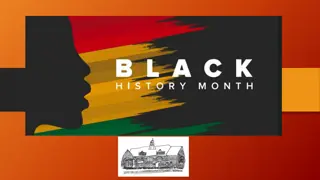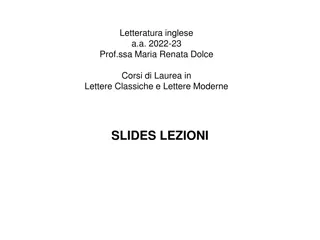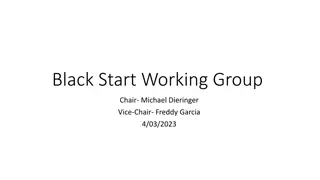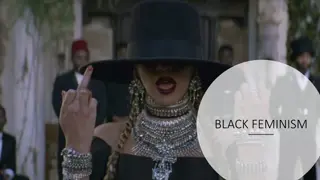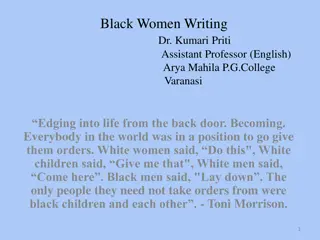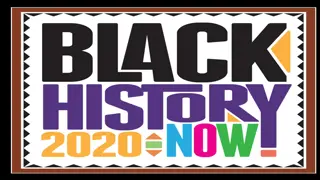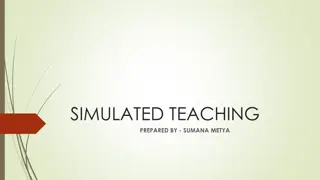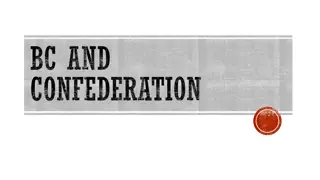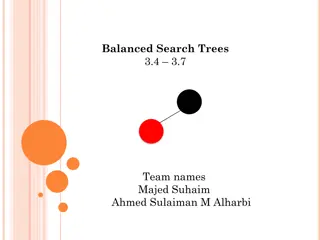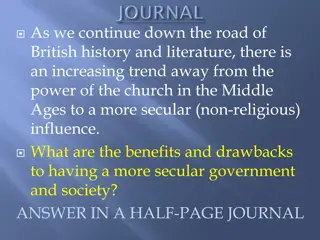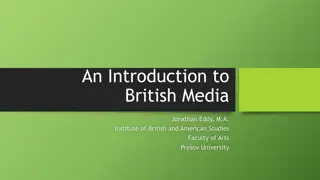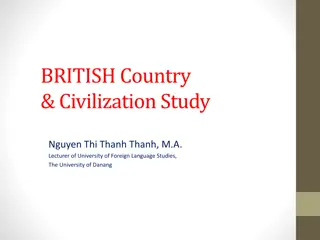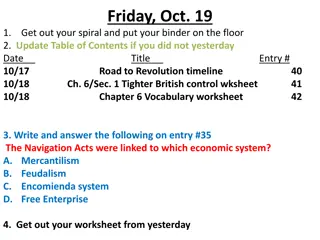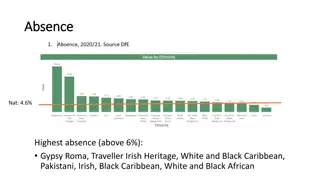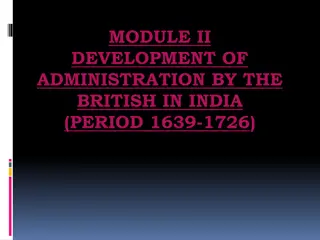The Case for Teaching Black British History: Latest Evidence and Initiatives
Explore the importance of teaching Black British history with insights from The Black Curriculum, a social enterprise aiming to fill the gap in national curriculum. Learn about their mission, vision, and ongoing programs to empower students and educators with a sense of cultural identity and belonging through accessible history education.
Download Presentation

Please find below an Image/Link to download the presentation.
The content on the website is provided AS IS for your information and personal use only. It may not be sold, licensed, or shared on other websites without obtaining consent from the author. Download presentation by click this link. If you encounter any issues during the download, it is possible that the publisher has removed the file from their server.
E N D
Presentation Transcript
The Case for Teaching Black British History Latest Evidence Elizabeth Kwaw UCET Annual Conference Tuesday 14th November 2023
Presentation Outline The Black Curriculum and The Working Group Educational practitioners perspectives on the history programmes of study in the National Curriculum Views on the proposed Model History Curriculum What do the findings tell us?
About The Black Curriculum The Black Curriculum is a social enterprise that aims to address the lack of Black British history in the national curriculum Our mission is to teach accessible and engaging Black British history all year round, 365 days a year, to support social cohesion and knowledge development in young people Our vision is to empower all students (3-25) with a sense of national and cultural identity and belonging through the teaching of Black British history
About The Black Curriculum We currently deliver a range of programmes that: Equip teachers with skills and resources to teach Black British history all year round Make Black British history accessible to all ages Prepare students to become fully rounded citizens, ready for an increasingly globalised world
About The Black Curriculum Since the organisation was set up in 2019, we have reached over 4,000 young people through our Assemblies, School Workshops and young people focused programmes Our Teacher Training programme has supported over 6,000 teachers across 100 schools nationwide
The Black Curriculums Working Group In April 2023, The Black Curriculum set up a Working Group to steer our policy work We run a consultation exercise as part of the Working Group activities The consultation explored stakeholders' views on the Government s proposed Model History Curriculum, and also on the teaching and learning of Black British history under the history programmes of study for Key Stages 1-3
Background of Respondents Consultation exercise was carried out from mid August - mid October 2023 41 respondents Almost all were responding in their own right 2 were responding on behalf of a school and a training provider Majority were teaching practitioners, these included Head of History, Headteachers, Assistant headteachers, Senior Curriculum leads and heads of other subject areas
Views on the National Curriculum (KS1) 61% do not think that the current KS1 history programmes of study is clear on how history should be taught in schools The same proportion, 61%, also feel that the current KS1 history programmes of study is too narrow With regards to whether the KS1 history programmes of study is clear about including key historical events linked to Black British history, a significant proportion, 70%, disagree or strongly disagree.
Views on the National Curriculum (KS2) When it came to KS2, a slightly lower proportion (54%) compared to KS1 also did not think that the history programmes of study for KS2 was clear on how history should be taught in schools However, a higher proportion, 76%, think that the KS2 history programmes of study is too narrow A majority, 90%, also disagree or strongly disagree with the statement that the history programme of study for KS2 is clear about including key historical events linked to Black British history
Views on the National Curriculum (KS3) Under KS3, just under half (49%) also disagreed or strongly disagreed with the statement that the history programmes of study was clear on how history was taught Just over two thirds (69%) think that the KS3 history programmes of study is too narrow Similar to KS2, a large majority (90%) disagreed or strongly disagreed with the statement that the KS3 history programmes of study were clear about including key historical events linked to Black British history
Comments on the Current Curriculum I have found from experience that because of the amount needed to be covered black history is often a bolt on or a stand alone. There is still work to be done on making this feed into the curriculum and flow throughout The KS1 curriculum is less narrow than the KS2 and KS3 curriculum as the latter stipulates topics that would be studied, which leaves less room to maneuver. None of the examples given in the national curriculum refer to Black British history..
Comments on the proposed Model History Curriculum The views here were largely skeptical regarding the difference between what was being proposed under the Model History curriculum and current guidance To me, it is no different to what is stipulated in the national curriculum There is no current acknowledgement of shared knowledge of British and world history At a glance it does not seem that different. Needs to be unpacked, substantiated and exemplified- the statement above is too broad and lacking in specificity I do think this general statement could be given for the current curriculum and is skewed very easily to not include black history
Comments on the proposed Model History Curriculum Approximately half were either not very confident or not at all confident that the proposed Model History Curriculum will include Black British history or address gaps in the current curriculum on the teaching of Black British history Some of the phrasing seems to be dressing up the National Curriculum without necessarily addressing which areas need to be changed/included Because of the language used and the ambiguity around the subject. It still seems open to interpretation and context-dependent translation I think it will however I feel like it may be more tokenism than purposeful It s too broad and no real reference or timelines are addressed to support delivery
What do these findings tell us about teaching Black British history in our schools? Nine years ago, 2014, was the first start of a petition to the Government calling for the introduction of Black History in the primary curriculum. This petition generated 43,914 signatures Since then, there have been a number of calls about this including from The Black Curriculum Throughout these calls the Government has stuck to the same position. Its latest response, following on from a request by The Black Curriculum, was that the national curriculum as a framework is broad, balanced and flexible This is clearly not the case, as shown by our recent consultation with practitioners who work in the education sector
What do these findings tell us about teaching Black British history in our schools? The findings demonstrate that there is still a need to push for the recognition of Black British history in the national curriculum Schools are being left to interpret the guidance on teaching history programmes of study - the guidance is currently too narrow, and lacks emphasis on how Black British history can be embedded The proposals linked to the Model History Curriculum are ambiguous and do not make any references to Black British history
How to find out more? The report on the findings from the Consultation Exercise will be launched in the New Year To learn more about The Black Curriculum s work visit: https://theblackcurriculum.com/


